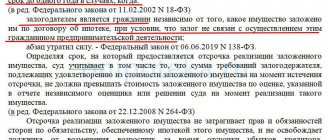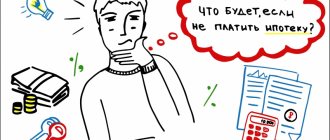On November 29, 2021, the Supreme Court issued a Determination that caused a lot of noise. In short, the Supreme Court of the Russian Federation allowed the seizure of a single apartment from a debtor during the bankruptcy process. Although, as everyone knows, Article 446 of the Civil Procedure Code prohibits the seizure of the only housing.
The media presented it as a disaster and sensation. “Soon bailiffs will throw thousands of people across the country out of their only apartments because of debts”—this is exactly the conclusion that readers of online publications should have made.
In this article we analyze court decisions and this situation as a whole. We can say right away that the Supreme Court’s ruling will not affect ordinary borrowers at all. No one will massively deprive people of their only apartments. However, first things first.
From the article you will learn what the Supreme Court was guided by when depriving the only housing of its immunity. Spoiler - it turned out that in fact this is not the debtor’s only home.
Debtor borrows $250,000, buys an apartment, does not pay back the money
This long story began in 2007, when Frushchak A.V. (debtor) borrowed money from Danielyan Yu.Yu. $250,000. Should have been given on May 31, 2009. Looking ahead, let's say - I didn't give it away.
In 2008, Frushchak bought a three-story, five-room apartment with an area of 198 square meters, around which litigation later flared up.
In 2010, Danielyan Yu.Yu. entered into an agreement with Kuznetsov A.L. (creditor). According to the agreement, the right to demand $250,000 from Frushchak now passed to Kuznetsov. Seeing that the debtor was in no hurry to repay the money, Kuznetsov went to court, which sided with him and decided to collect the debt from Frushchak. The writ of execution went to the bailiff.
The bailiff discovered that the debtor owned this five-room apartment and seized it. This deprived Frushchak of the opportunity to quickly sell it.
After this, Frushchak tried in court to challenge the agreement on the assignment of claims between Danielyan and Kuznetsov, but the court refused. However, in 2011, the seizure of the apartment was lifted.
The first round is for the debtor. But now he was faced with a pressing question: how to protect valuable real estate?
Circumstances of the dispute
In 1999, Kaluga resident Ivan Revkov issued a loan of 772,500 rubles. to his friend Elena Shakhlovich, but she did not return the money. The creditor "settled" the debt, but was unable to collect funds through enforcement proceedings. 19 years later, in 2021, the court indexed the amount of debt to 3.91 million rubles. Then Revkov achieved bankruptcy for Shakhlovich (case No. A23-2838/2019).
But the financial manager refused to include Shakhlovich’s 110-meter apartment in the bankruptcy estate. The courts confirmed the refusal and extended executive immunity to the property, which is the debtor’s only home. Revkov drew attention to the fact that Shakhlovich bought the property in 2009 at a price much higher than the amount of the debt, and after the court made a decision on foreclosure and even after the initiation of enforcement proceedings in 2006.
Will it be prohibited to evict from former official housing?
Read more…
In early January, Economic College Judge Ivan Razumov refused to refer the dispute over the apartment to the Supreme Court, thereby recognizing the correctness of the decisions of the lower authorities. After this, Revkov appealed to the Constitutional Court.
How to save a three-story apartment from foreclosure?
It’s very simple - you need to transfer the apartment to another person. Who exactly? For my wife, of course, because this is the simplest and most logical thing.
In August 2011, the debtor entered into an agreement with his wife on the division of property. According to this agreement, the apartment, which was subsequently valued at 27 million rubles, allegedly cost 762 thousand rubles. By agreement, Frischuk’s wife became the owner of the apartment. A week after the agreement was concluded, the spouses divorced, and five days after the ex-wife’s property rights were registered, she gave the apartment to her daughter.
What did the debtor achieve by these actions? The apartment was no longer his property, which means the bailiff could not foreclose on it, that is, transfer it to the creditor to pay off the debt.
Of course, the creditor did not like this very much, and he went to court to have the transactions declared invalid and the apartment returned to Frushchak’s ownership so that it could be collected against the debt. The creditor stated that the transactions were concluded only for the purpose of escaping debts. The court granted that claim:
- deed of gift for an apartment in favor of Frushchak’s daughter and
- agreement on the division of property between Frushchak himself and his wife
were declared void (this is a legal term).
The apartment was transferred to the debtor, and the creditor again had the opportunity to turn this apartment into his property to pay off the debt.
Comment: Some debtors try to hide their property from creditors. But we want to warn these people - the financial manager and the court have enough tools to recognize such deception. The financial manager studies the transactions concluded before the debtor’s bankruptcy and if he sees that, for example, the debtor sold real estate at a price several times lower than the market price, he will challenge these transactions in court.
However, in the described case, the creditor, challenging the transaction, did not apply the provisions of the Bankruptcy Law, because During this process, individuals in Russia could not yet go bankrupt. The creditor challenged the transaction, applying Art. 10 and Art. 170 of the Civil Code. Article 10 prohibits the abuse of rights, and Article 170 talks about what void transactions are.
So, the apartment returned to the debtor's ownership. This happened in February 2015.
After this, the bailiff seized the apartment again, because the debt had not yet been repaid. Frushchak challenged this arrest in court, but the court decided that the bailiff acted legally.
In what cases can they be evicted?
The grounds for eviction are regulated by Art. 293 of the Civil Code of the Russian Federation and Art. 91 of the Housing Code of the Russian Federation. The reasons may be:
- Use of living space for purposes other than its intended purpose.
If a citizen uses private real estate to sell goods or store things as a store or warehouse, or organizes an office or production there, this may violate sanitary and safety standards.
- Violation of neighbors' rights.
For alcohol abuse, systematic rows and riots, a citizen can be evicted from an apartment if his actions disturb the peace and jeopardize the safety of his neighbors.
- Negligence leading to the destruction of a building or premises.
Redevelopment without the appropriate permission or violation of sanitary standards can cause the destruction of the building or make it uninhabitable.
- Large debts on utility bills.
Eviction for debt is a last resort. First they issue warnings and attempt to recover money through the courts. If this does not help, and the debtor does not have valid reasons, the rental agreement can be terminated.
- Deprivation of parental rights.
If, according to a court decision, a parent cannot live with a child due to cruel treatment and deprivation of parental rights, he may be evicted from the apartment.
- Unauthorized occupation of housing.
Read How long does the bankruptcy procedure for an individual take for loans?
If an individual lives in an apartment illegally, you can easily expel him by contacting law enforcement agencies or the court.
Law-abiding citizens are most concerned about the issue of debts to banks and microfinance organizations for loans, borrowings and mortgages. So, under the new law, is it possible to be left without the only home due to debts? Theoretically, under a number of circumstances, this is possible, but rarely in judicial practice such cases end in loss of living space. However, it is not worth accumulating debts, hiding from the bank collection service and bailiffs, hoping for the protection of the law. It’s better to deal with the debt trap and restore peace of mind to yourself and your family.
The debtor makes a serious mistake - he tries to pretend that he has nowhere to live
The debtor's daughter appealed to the court to have him forcibly removed from registration in her apartment, but the court refused. Then the debtor voluntarily withdrew from registering his daughter’s apartment. Please note - he “checked out” of the apartment of his own free will. Now, formally, the only place where he can live is the disputed apartment.
The debtor made a mistake by deregistering voluntarily. The Presidium of the Moscow Regional Court, which considered this case, noted that the debtor withdrew from registering his daughter’s apartment of his own free will. Why did he do this? The court decided that Frushchak decided to create the appearance of a situation that he had nowhere to live except in the seized apartment, so that the bailiff could not sell it for debts. We believe that these actions were a serious tactical mistake by the debtor, which could ultimately cost him his apartment. By the way, by that time the apartment was already valued at 20.6 million rubles.
What triggered it?
The draft law began to be developed in 2012 after the decision of the Constitutional Court of May 14, 2012 on a complaint from citizens who challenged the legality of the ban in the Code of Civil Procedure of the Russian Federation to foreclose on the only housing. In making its decision, the Constitutional Court agreed that the prohibition provision should not apply to cases where the size of the debtor’s home significantly exceeds the established standards. At the same time, the court decided that the cost of the debtor’s housing is significant and can repay the debt without prejudice to the constitutional rights of the debtor, provided for in Art. 40 of the Constitution of the Russian Federation.
The court ordered changes to be made to the legislation, eliminating the imbalance of interests of the debtor and the collector. Also, back in 2007, the Constitutional Court of the Russian Federation recognized the prohibition of foreclosure on the debtor’s land plots as unconstitutional.
Fleeing from debt, Frushchak declares himself bankrupt
Since October 2015, individuals in Russia have been able to apply to an arbitration court to have it declare them bankrupt. Fruschak took advantage of this opportunity in 2021. Why he didn’t do this earlier, we don’t know.
The court granted the claim for bankruptcy and introduced a procedure for the sale of the debtor's property.
The creditor, being the only creditor, asserts his claims. But apart from the disputed apartment, there is absolutely nothing to collect from the debtor, and the apartment cannot be recovered - formally, it is the debtor’s only home.
The creditor applies to the arbitration court to have the disputed apartment included in the bankruptcy estate. The court refuses.
The bankruptcy estate is the property of the debtor, which will go to creditors in the bankruptcy process. The debtor is interested in having as little of his things as possible included in this mass; creditors are interested in ensuring that the maximum amount of the debtor's property becomes the bankruptcy estate.
The creditor goes to appeal, then to cassation. Court decisions are granite-hard and unchangeable - the apartment cannot be turned into a bankruptcy estate, because it is the debtor’s only home.
The creditor does not despair and reaches the Judicial Collegium for Economic Disputes of the Supreme Court. And a local revolution occurs.
Will there be exceptions for those in difficult situations?
— As you can see, the majority of Russian citizens stopped paying loan payments (or paying for housing and communal services) within the designated time frame due to circumstances that were in no way dependent on them. Let's say they were fired from their job. Would it be fair to take away part of their living space?
— If individuals – citizens – are not the owners of residential premises, they will be evicted after six months of non-payment of utilities. They will be accommodated based on dormitory standards - 6 “squares” per citizen. And if a citizen does not pay his obligations, but is at the same time the owner of a residential premises, he will be evicted to a smaller residential premises within the region in which he lived.
— Does the project not take into account the circumstances due to which a person found himself in a difficult financial situation?
— On this, of course, we agree with you. But still, most often, banking institutions and housing and communal services will act as opposing parties. Will restrictions be introduced for certain categories of individuals - debtors? - This is not the point at all! The problem of depriving debtors of their only home is to protect the opposite party and its legitimate interests. Let's say the court of the Kaluga region made the following decision: to pay two million rubles to a citizen who was left without a roof over her head. The deal to buy her apartment was declared illegal. The defendant, who sold the residential premises, owns a luxurious penthouse, but at the same time claims that he is not able to repay the debt incurred to this woman. “Confiscation” of part of a luxury building is prohibited under the laws of the Russian Federation. You understand that in such a situation it is also difficult to talk about justice.
— “Registration” of relaxations is not provided for in Article 446 of the Civil Procedure Code. Each situation will be considered by the arbitration court on an individual basis.
— For the seventh time since 2003, the Constitutional Court has issued rulings allowing the confiscation of residential premises from individual debtors. But so far no amendments have been made. How will things be this time?
“Now they will definitely be brought in.” Before this, the Constitutional Court made decisions that could be considered generalized. Now the legislator has received a clear demand from him.
The Supreme Court overturns the decisions of all lower arbitration courts
Strictly speaking legally, the Supreme Court did not include the apartment in the bankruptcy estate. He only canceled all the decisions of the lower arbitration courts, which refused to include the apartment in the bankruptcy estate, and sent the case for a new trial. Now the case will be considered again by the court of first instance. However, in its Determination, the highest court stated its position so clearly that there is no doubt - the apartment will be included in the bankruptcy estate, that is, the debtor will lose ownership of it.
For reference: when the Supreme Court considers a case, it can independently make a decision, or it can send the case for a new trial by the court of first instance, giving this court clear instructions on how to consider the case. Of course, the court of first instance is obliged to obey the opinion of the Supreme Court - that is, it is obliged to make a decision taking into account the opinion of the Supreme Court.
What is the Kremlin’s position on this issue?
What do they say about the bill that allows debtors to be deprived of their only home?
As Dmitry Peskov says, it is necessary to undertake a detailed study of this proposal. It must be considered from all sides, especially from the legal side.
According to the Kremlin, it is too early to highlight any position regarding the Ministry of Justice’s proposal to deprive debtors of their only home. This news was reported recently by the press secretary of the President of the Russian Federation, Dmitry Peskov.
“This is a working proposal that still needs to be worked out in detail - both from a legal point of view and from a law enforcement point of view. It is necessary to study the opinions of other departments on this issue. Therefore, it is too early to report that the Kremlin has any definite opinion on this matter,” Peskov said.
The main conclusion about this case: it will not affect debtors in any way.
At the time of writing this article, a new hearing of the trial court, which will resolve the case on its merits, has not yet taken place. But the Supreme Court stated its position clearly, so there is no doubt that the apartment will fall into the bankruptcy estate and will be sold at auction.
The disputed apartment is only formally the only suitable home for the debtor. In fact, he has a place of residence other than his apartment.
The debtor put a lot of effort into deceptively creating the impression that the apartment was the only place where he could live. But the court analyzed the entire situation and discovered fraud (bad faith).
The main conclusion is that with a 99% probability this decision will not affect bankrupts. This decision will not become a precedent, and no one will evict bona fide borrowers from their only home for debts.
Eviction from the only home with a mortgage
If the debtor’s only home is under a mortgage, according to the situation in 2021, they can actually be evicted from it. The loan agreement with the bank stipulates that if payment is not made, the bank may file an application with the court to foreclose on the apartment.
The threat of being left without an apartment if it is mortgaged exists both among debtors who have other real estate and among those who do not.
Read Seizure of the debtor's property by bailiffs
How does the process of “eviction” from the only housing occur?
According to the bill, the forced sale of housing for debts can only be carried out by a corresponding court decision. There are corresponding regulations that concern the features of the debtor’s house or apartment, area and cost. If the court rejects the claimant's claim against the owner, the sale of the living space will be considered illegal.
In a case involving debts with subsequent possible eviction, the court must hear the following parties:
- claimant;
- debtor;
- debtor's family members.
The court decides not only the question itself, whether to evict the debtor from the only home or refuse the claimant, but also, in the case of a positive decision in favor of the plaintiff, the amount for which the former owner has the right to buy a new home.
You must decide to purchase a new apartment within 90 days. Otherwise, the funds allocated for this go to the state budget. Local governments provide assistance in finding housing.
The authors of the bill and debt collectors believe that for debtors, the real risk of eviction from their only home will increase payment discipline.
There are several categories of individuals who cannot be evicted from their apartment:
- disabled people of groups I and II;
- minors whose parents have no other housing;
- dependents of the owner;
- single parents;
- those who executed a testamentary refusal;
- those who received real estate under a marriage contract;
- refused privatization in favor of the owner.
The legislation is on the side of the owners and does not allow eviction from the only home in most cases. Neither collection services, nor collectors, nor bailiffs can kick you out of an apartment - this is done only by court decision. If this is initiated by the state, the citizen will be offered housing of equal value. The bill only allows for eviction from a mortgaged apartment or seizure of real estate for debts on alimony and compensation for harm to health.
Are you planning to go bankrupt? We are waiting for your calls at Legal Bureau No. 1
To go bankrupt, the debtor needs a financial manager, and the debtor must find one on his own. Legal Bureau No. 1 has both financial managers and lawyers on its staff, so you don’t have to look for a financial manager.
During the bankruptcy process, we make the debtor's life as comfortable as possible. For example, we “knock out” through the court the opportunity to spend more money on life than specified in the law.
You will find out the real prognosis of your case already at the first consultation, because we work only with bankruptcies of individuals and have accumulated serious experience.
Call! You will ask all your questions to a practicing lawyer and hear competent, accurate answers.
How does the process of “eviction” from the only housing occur?
According to the bill, the forced sale of housing for debts can only be carried out by a corresponding court decision. There are corresponding regulations that concern the features of the debtor’s house or apartment, area and cost. If the court rejects the claimant's claim against the owner, the sale of the living space will be considered illegal.
In a case involving debts with subsequent possible eviction, the court must hear the following parties:
• the claimant; • debtor; • family members of the debtor.
The court decides not only the question itself, whether to evict the debtor from the only home or refuse the claimant, but also, in the case of a positive decision in favor of the plaintiff, the amount for which the former owner has the right to buy a new home.
You must decide to purchase a new apartment within 90 days. Otherwise, the funds allocated for this go to the state budget. Local governments provide assistance in finding housing.
The authors of the bill and debt collectors believe that for debtors, the real risk of eviction from their only home will increase payment discipline.
There are several categories of individuals who cannot be evicted from their apartment:
• disabled people of groups I and II; • minors whose parents have no other housing; • dependents of the owner; • single parents; • those who executed a testamentary refusal; • those who received real estate under a marriage contract; • those who refused privatization in favor of the owner.
The legislation is on the side of the owners and does not allow eviction from the only home in most cases. Neither collection services, nor collectors, nor bailiffs can kick you out of an apartment - this is done only by court decision. If this is initiated by the state, the citizen will be offered housing of equal value. The bill only allows for eviction from a mortgaged apartment or seizure of real estate for debts on alimony and compensation for harm to health.
Eviction procedure
As mentioned above, eviction from any apartment can only be by a court decision. If the tenant does not comply with this decision voluntarily, the plaintiff applies to the bailiff service with a petition to initiate enforcement proceedings.
After the SSP employee accepts the writ of execution and opens proceedings on it, he notifies the plaintiff and defendant in this case. In addition, he sends a demand to the defendant to collect an enforcement fee from him.
Then the SSP officer sets a deadline for eviction and sends a written notice to the defendant, in which he invites the latter to comply with the court decision voluntarily.
After the expiration of the period specified in the notice, the bailiff has the right to carry out a forced eviction without prior warning, if necessary, involving employees of the Ministry of Emergency Situations and law enforcement agencies.
The main task of the SSP employees is to free the property from illegal occupants, their property, and pets. The entire procedure takes place in the presence of two witnesses. When vacating a residential premises, the bailiff must draw up two documents:
- an eviction act, which all participants in the procedure must sign;
- inventory of the defendant's property.
If the evicted person has nowhere to take his things, after they have been described, they can remain in safekeeping for two months; in this case, a note is placed in the document where exactly the defendant’s property will be located and the latter can pick it up at any time.








